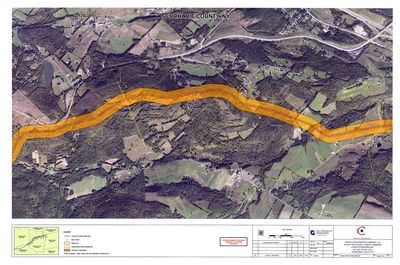Subscriptions
Menu
Advertisements
Schoharie County rejects Murray bid to back Constitution
12/26/2012 |
By David Avitabile |

Schoharie County supervisors rejected a resolution supporting the proposed Constitution Pipeline Friday and instead asked the Federal Energy Regulation Commission to respect the zoning and land-use laws of the individual towns and villages in the county.
Offered by Cobleskill Supervisor Tom Murray, the resolution supporting the pipeline never even got to the floor Friday morning as supervisors, in a split vote, agreed to remove it from the agenda.
The abandoned resolution stated that supervisors agreed FERC should issue a "certificate of public convenience and necessity" because the location of the pipeline "will serve as an economic driver which would add jobs, increase demand for housing, increase sales taxes, increase the tax base, as well as providing up to $5 million a year in property taxes."
Several supervisors said the $5 million estimate was way too high.
There was little discussion on the resolution as Fulton Supervisor Phil Skowfoe quickly asked for its removal shortly after the board convened.
Mr. Skowfoe said the resolution should be removed and towns themselves should decide whether to support the pipeline.
"This isn't something this county should stand behind," he said.
Two other resolutions were approved in split votes. One asked for FERC to take into account the zoning and land-use laws of the towns and villages of the county. The other asked the state DEC to suspend review of any applications involving fracking wastewater treatment in the county until the State Department reviews the issue.
But Jefferson Supervisor Dan Singletary backed the resolution supporting the pipeline because he said the county should show that it favors bringing in businesses.
Jefferson, he said, is near Delaware County which has already passed a resolution supporting the pipeline.
"How friendly are we to businesses?" he asked, adding that the county needs jobs.
"The county should take a stand," Mr. Singletary said. The pipeline issue "needs a discussion further than we've given at this point," Mr. Singletary said.
The advantages to having a pipeline run through the county are few, Schoharie Supervisor Gene Milone countered.
Though the resolution supporting the pipeline claimed the line would be "considered an 'open access pipeline' meaning that local municipalities or public utilities could potentially tap the line in the future to provide residential, commercial and industrial gas service," Mr. Milone noted there is no access from other lines that run through the county.
"Where is access to the product those pipelines carry?" he asked. "It doesn't exist."
He added that the employment created by the pipeline would be temporary.
Mr. Buzon added, "I haven't seen any jobs from existing pipelines."
He said he did not see the new pipeline supplying gas to homes and businesses in the county.
Other supervisors stressed the home-rule argument, saying the county shouldn't take a stand. Mr. Skowfoe said the decision on supporting the pipeline should be made on a town-by-town basis.
Jim Buzon of Middleburgh said the other resolution asking FERC to honor the zoning and land-use laws of the towns and villages "gives the home rule we want."
Larry Bradt of Carlisle, who noted that his town has had a pipeline and a gas facility for several years, added, "It should be left up to the individual towns."
Mr. Murray said he offered the pulled resolution to support the line because it was "just a nice gesture," and added, "If FERC says it's coming through, it's coming through."
The two approved resolutions did not cause as much discussion as the one that was removed.
The one asked FERC to "respect and consider relevant portions of the comprehensive plans, land use laws, and/or resolutions, of all towns and villages within the county."
The comment will also ask FERC to study and "effectively mitigate the possibility that the Constitution Pipeline project encourages and enables heavy industrial developments within those towns and villages which have enacted plans, laws, or resolutions opposed to such developments."
Mr. Singletary asked that this paragraph be removed from the resolution but his motion was defeated.









